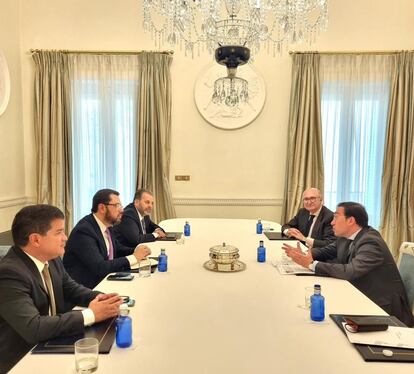New opposition platform aiming to distance itself from radicalism: “Venezuela cannot suffer any more”
The coalition, headed by prominent opposition leaders Timoteo Zambrano, Antonio Ecarri and Luis Augusto Romero, will comprise anti-Chavistas and dissidents from the ruling party


A new opposition platform that aspires to steer away from radicalism and reduce polarization in the public debate has emerged in Venezuela recently. It is fronted by three distinguished political leaders of the opposition - Timoteo Zambrano, Luis Augusto Romero and Antonio Ecarri. “Today, Venezuela is a much more diverse country than it may seem. More than 70% of Venezuelans want nothing to do with the political class that has ruled for the last 25 years. It is outdated and the country wants to find alternatives”, says Ecarri in a telephone interview.
This Thursday in Madrid, the three leaders held a meeting with the Minister of Foreign Affairs, José Manuel Albares. They were accompanied by Juan Fernández Trigo, Secretary of State for Ibero-America, who had just flown back from the summit of diplomats held in Bogota following the request from Gustavo Petro to address the Venezuelan crisis. The 20 convened nations failed to reach an agreement and at the end of the summit, the Colombian Foreign Minister read out a three-point agreement that entailed no new developments: the date for the 2024 elections must be established; the agreements between the Chavist government and the opposition must be accompanied by the easing of sanctions; and the dialogue process in Mexico must recommence simultaneously with the creation of a fund for social investment in the country.
Ecarri argues that this is not merely a typical opposition platform, but that it will integrate leading figures of different backgrounds, including Chavism dissidents. “We are in the process of building the platform with people from both sides of the divide. We want to diversify the country, so that there are not only two blocs. We have to depolarize the country. This is the only way out of the crisis we are immersed in”, explains Ecarri, secretary general of the Alianza del Lápiz, the leading opposition group in Caracas, the country’s capital.
On his visit to Madrid, the opposition leader quoted the former president of the Spanish Courts, Torcuato Fernández Miranda, during the Transition, who said that Spain could not suffer any more. “I think the exact same thing: Venezuela cannot suffer any more. There must be a smooth transition”, he insists. In the meeting with Albares, the problem of Venezuelan migration came up. An estimated six million have left the country and Ecarri believes that this must be combated by providing more opportunities for the population. “Otherwise, we will continue to generate waves and waves of migrants”, he adds.
The platform does not have much faith in the dialogues in Mexico, where the pro-Chavista government and the Unitary Platform, an alliance of the main opposition parties, are engaged in negotiations on a solution to the severe political and social crisis in the country. They are also working towards the organization of presidential elections in 2024 with guarantees that the opposition will have a realistic chance of overcoming the current president, Nicolás Maduro. “The dialogue is destined to fail,” Ecarri states bluntly. “Not all Venezuelan parties are involved. These are the two most rejected political fronts in the country, both Maduro and the G-4. We need a more pluralistic dialogue.”
The launch of the platform, under the working name of the Independent Pact for Popular Change, is planned for July. Negotiations have taken place concerning the incorporation of the Communist Party of Venezuela, as well as the Alianza del Lápiz, headed by Ecarri himself; Cambiemos, Timoteo Zambrano’s party, which boasts a substantial parliamentary representation; and Avanzada Progresista, led by Romero. The emergence of this alliance comes at a time of considerable fragmentation within the opposition, which has failed to define its position in the last few years. The now-defunct interim government under the leadership of Juan Guaidó proved to be unsuccessful and the rest of the parties have not succeeded in unifying for a common stance against Chavism, although efforts are being made to settle the matter. When an election date is set, the opponents will hold primaries that will yield a single candidate who will be endorsed by the others. The new platform will present its own candidacy independently.
Sign up for our weekly newsletter to get more English-language news coverage from EL PAÍS USA Edition
Tu suscripción se está usando en otro dispositivo
¿Quieres añadir otro usuario a tu suscripción?
Si continúas leyendo en este dispositivo, no se podrá leer en el otro.
FlechaTu suscripción se está usando en otro dispositivo y solo puedes acceder a EL PAÍS desde un dispositivo a la vez.
Si quieres compartir tu cuenta, cambia tu suscripción a la modalidad Premium, así podrás añadir otro usuario. Cada uno accederá con su propia cuenta de email, lo que os permitirá personalizar vuestra experiencia en EL PAÍS.
¿Tienes una suscripción de empresa? Accede aquí para contratar más cuentas.
En el caso de no saber quién está usando tu cuenta, te recomendamos cambiar tu contraseña aquí.
Si decides continuar compartiendo tu cuenta, este mensaje se mostrará en tu dispositivo y en el de la otra persona que está usando tu cuenta de forma indefinida, afectando a tu experiencia de lectura. Puedes consultar aquí los términos y condiciones de la suscripción digital.








































